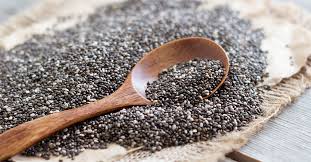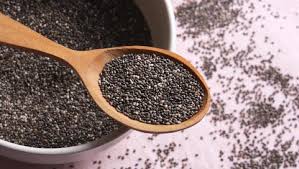Cholesterol has certain important functions in the human body. It is made in the liver and keeps the walls of the cells flexible. Cholesterol is also needed to make several hormones. But like any other element, too much cholesterol can create a problem for your body. This is because cholesterol doesn’t dissolve in water. Lipoproteins are needed to transport cholesterol and fat-soluble vitamins in the blood.
The high content of low-density lipoprotein causes cholesterol deposits in blood vessel walls. This can cause clogged arteries, heart attacks, kidney failures, and strokes. High-density lipoprotein carries cholesterol and prevents its deposition. There are a lot of natural ways to increase the high-density lipoprotein content in the body.
Sabja seeds
Sabja seeds are similar to sesame seeds but are black. They typically come from sweet basil, Ocimum basilicum, a plant used to season foods. The basil plant is native to India. Basil seeds are also known as falooda seeds or tukmaria seeds. These are rich in nutrients and immunity-boosting properties. Sabja Seeds have a lot of health benefits like regulating blood sugar, improving metabolism, reducing inflammation, and reducing cholesterol levels. These seeds have a long history of use in Chinese and Ayurvedic medicine.
How do sabja seeds reduce cholesterol levels
Soluble fiber is a compound found in plants that dissolves in water. The human body isn’t able to digest it. But, the bacteria, called probiotics, present in the intestines can digest soluble fiber. These bacteria reduce the harmful kinds of lipoproteins, LDL and VLDL. Based on a study done by the National Library of Medicine, taking 3 gm of soluble fiber daily for a few months decreased the low-density lipoprotein by 18 percent.
Reducing the low-density lipoprotein reduces the cholesterol deposits in the blood vessel walls. Sabja seeds are rich in pectin which is a soluble fiber. Pectin binds substances in the intestine and adds bulk to the stools. It improves blood fat levels by binding with cholesterol in your digestive tract. Cholesterol is prevented from being absorbed and entering blood vessels. This reduces the risk of heart disease.
How to use Sabja seeds
Basil seeds can be bought in Asian food stores or online eCommerce portals. Search for ‘edible basil seeds’ to find the right ones. Since, these seeds are also used for planting, be careful while buying them. The ones used for planting cost more per ounce and might be treated with pesticides.
To eat the basil seeds, you will have to soak them for some time. For soaking, take 1 cup of water per 1 tablespoon of basil seeds. You can use more water if you would want to. Using less water for soaking can cause the seeds to clump as they hydrate. Soak them for at least 15 minutes till they swell and approximately triple in size. The gel-like outer portion will turn grey post soaking. After soaking the seeds for about 15 minutes, you can add them to your recipe.
The basil seeds can be used in a lot of recipes and drinks. Smoothies, milkshakes, salad dressings, pudding, oatmeal, bread, muffins, etc. are some food products where you can add these seeds. Basil seeds can also be used to replace eggs in baking goods. You can grind them and replace the flour with it. Your baking dish will become healthier by using sabja seeds.
Precautionary disclaimers
Some disclaimers that you must keep in mind before consuming sabja seeds are:
- These seeds increase the estrogen levels in the body. Hence pregnant women should not take sabja seeds without a doctor’s prescription.
- Small children can choke on seeds if they are not swollen in water properly.
- Sabja seed extracts are known to reduce blood clotting. So, if you shouldn’t take these seeds post-surgery. Ensure that you don’t consume sabja seeds at least 2 weeks before undergoing any surgery.
- Other side effects include diarrhea, nausea, loss of appetite, headache, vomiting, etc.
Reducing cholesterol is one of many health benefits that sabja seeds have. It also helps in reducing blood sugar levels, relieving constipation, reducing the risk of heart attack, and reducing stress and anxiety. If you have high cholesterol levels in your body, then you can consult your doctor and start the intake of sabja seeds to reap its health benefits.
See More As:
- Daily Best Skincare Regime and Order for Perfect Skin
- 10 Most Effective Ways To Prevent And Hide Dark Circles
- Importance of the Endocannabinoid System in Skin Health & Beauty
- Best Useful Tips for Glowing Skin: To Keep Skin Fresh & Healthy
The post How Sabja Seeds Help Reduce Cholesterol Levels appeared first on StylesGap.com.
from StylesGap.com https://ift.tt/30bNAem
via Regular Machine Embroidery Designs

.png)




Very nice seeds..it reduces high blood sugar blood
ReplyDelete